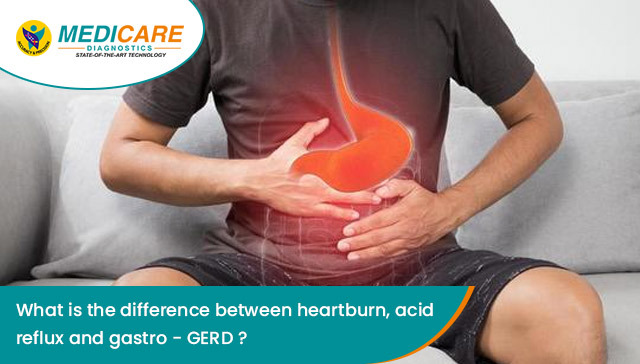
The Causes and Treatments of Nosebleeds
- 29 Feb, 2024

The terms heartburn, acid reflux and GERD are often used interchangeably, though they carry distinct meanings. Acid reflux occurs when stomach acid flows back into the oesophagus, whereas Gastroesophageal reflux disease (GERD) is its chronic form. Heartburn is an indication of acid reflux and GERD.
Difference between heartburn, acid reflux and GERD
Heartburn
Heartburn is a condition that occurs in the digestive tract, especially in the esophagus. It causes mild to intense chest pain, and is often confused with heart attack. Heartburn is caused by acid being released into the esophagus, which is more sensitive than the stomach. This acid causes burning sensation in the chest. Heartburn should be treated immediately if it is accompanied by other symptoms such as difficulty swallowing, a persistent cough, aggravation of asthma, loss of appetite, vomiting, or bleeding.
Acid reflux
Acid reflux is the reabsorption of food from the stomach into the esophagus. The most common symptom of acid reflux is heartburn, which is often felt after eating or while lying on your stomach.
The lower oesophagus (LES) is connected to the stomach by a circular muscle called a sphincter. The LES is responsible for tightening the esophagus after food is passed to the stomach. If the LES isn’t tight enough or if the LES doesn’t tighten properly, stomach acid will flow back into the body, resulting in acid reflux.
In addition to heartburn, acid reflux can also cause coughing, a sore throat, a bitter or sour taste in your mouth, and a burning and pressure sensation that can extend up your breastbone.
GERD
What is GERD? Geriatric gastroenteritis (GERD) is a condition characterized by acid reflux that occurs more than two times a week or causes inflammation in the esophagus. Common symptoms of GERD include: bad breath damage to enamel due to too much acid exposure heartburn feeling like stomach contents are being expelled into your throat or mouth having a persistent dry cough developing asthma having difficulty swallowing Chronic GERD can also cause asthma symptoms or dental problems due to the corrosive effect of stomach acid. In rare cases, GERD can progress to esophageal cancer.
Managing Acid Reflux, Heartburn, and GERD
Balasore's best diagnostic clinic gastroenterologists recommend some lifestyle changes to relieve the symptoms of heartburn and acid reflux and gastroesophageal reflux disease (GERD). These lifestyle changes include avoiding trigger foods such as tomatoes, citrus fruits, onions, garlic, spicy and fried foods, as well as tobacco-based products.
In addition to lifestyle changes, there are several treatment options for GERD and GERD. Doctors often recommend antacids to relieve symptoms. In cases where lifestyle changes and medication do not work and GERD persists, surgery may be recommended.
Nowadays, with modern treatments available, heartburn sufferers, acid reflux sufferers, and gastroenterologist sufferers don’t need to worry. They just need to contact the best gastroenterologist and get the right treatment.